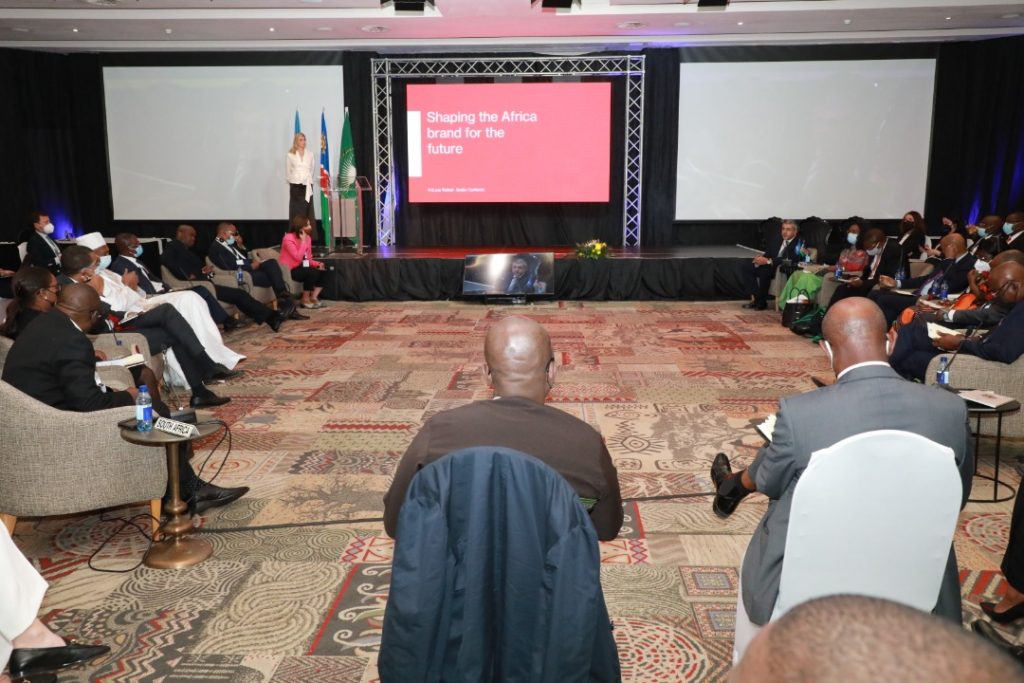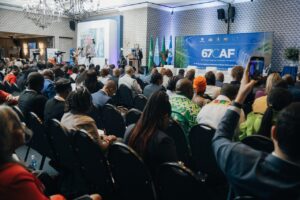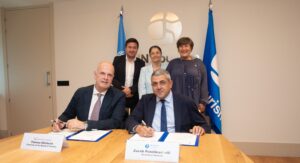Windhoek, Namibia on 15th June 2021
We, Ministers of Member States of the World Tourism Organization (UNWTO), Representatives of the African Union Commission (AUC), and African Union Development Agency (AUDA-NEPAD), as well as the private sector entities, participating in the UNWTO Regional Conference on Strengthening Brand Africa for the Swift Recovery of the Tourism Sector, held from 14 to 16 June 2021 in Windhoek, Namibia gathered to a) leverage tourism as a cross-cutting sector with high impact on national and regional branding to enhance the image of African destinations as the building blocks of the overall image of Africa; b) engage the public and the private sectors as well as local communities and the diaspora in promoting a new narrative about Africa based on positive stories and experiences, developing synergies between countries to further strengthen the positioning and external perceptions of the continent; c) enhance destinations’ capacity and skills for brand development and management; marketing, including social media and storytelling, and effective communication and media relations; and d) identify and create compelling stories, enhance Micro, Small and Medium Enterprises’ capacity and competitiveness in the national, regional and global development agendas.
Relying on:
The United Nations (UN)’s 2030 Agenda for Sustainable Development, and especially its Sustainable Development Goals (SDGs) 8 – Promote sustained, inclusive and sustainable economic growth, full and productive employment and decent work for all and 10 – Reduce inequality within and among countries;
The UNWTO Agenda for Africa – Tourism for Inclusive Growth, and especially the Advocating the Brand Africa priority which aims at supporting African destinations to develop and manage a strong, resilient tourism image and thus increase Africa’s competitiveness in the global market; and
The AU–UN Framework for the Implementation of Agenda 2063 and the 2030 Agenda for Sustainable Development, adopted on 27 January 2018 at the 30th AU Summit in Addis Ababa, Ethiopia, having a harmonized and integrated approach to the implementation of the two Agendas in order to optimize resource use and mobilize the support of domestic and external stakeholders and development partners; and
The African Union (AU) Agenda 2063, and especially its goal of an Integrated Continent, politically united and based on the Ideals of Pan Africanism and Vision of African Renaissance; and
Recalling:
The conclusions of the UNWTO Regional Conference on Enhancing Brand Africa – Fostering Tourism Development adopted in Accra, Ghana on 17-19 August 2015.
Recognizing challenges facing African States, inter alia, that:
The development of tourism is hampered by negative perceptions and misconceptions, which are deleterious to the African States’ potential as a tourism region, and changing such negative perceptions will be a long process;
Promotion of domestic tourism and intraregional contributing to tourism development that is resilient against negative events, whether man-made or natural disasters;
While significant visa facilitation improvements took place over the past decade, visa facilitation still needs to be a priority for African countries and is particularly important to promote regional travel;
Implement the Continental Free Trade Area (AfCFTA) for free movement of goods and services, including the acceptance of the African Union passport
Skills availability and development is a considerable short-term challenge, with a lack of adequately aviation, tourism and travel professional;
Low level of connectivity, specially within the continent, has an adverse effect on tourism and investment; and
More collaborative efforts needed to address the lack of harmonised health and travel protocols across the continent and beyond especially during and post crises to reassure tourists and build traveller confidence.
Reaffirm the need to:
Annihilate the stereotypes and prejudices that negatively influence the perception of Africa as a tourist destination and contribute to shaping the image of the continent and its positioning in the world;
Build a strong and competitive ‘Brand Africa’ in an increasingly competitive marketplace and a constantly changing business environment to unlock the tourism potential;
Leverage tourism as a cross-cutting sector with high impact on the national and regional image of Africa to enhance the perception of individual destinations and Africa as a region;
Engage the public and the private sectors as well as local communities and the diaspora in promoting a new narrative centred on positive stories and successful experiences about Africa;
Enhance digitalization to widely and effectively promote a positive African narrative;
Support tourism start-ups, innovation and the creative industries, including gastronomy, to enhance the image of the region and its destinations;
Promote African culture and heritage to boost tourism in the continent;
Encourage private sector engagement in the creation and dissemination of content and storyboards that contribute to enhance the image of Africa;
Support evidence-based research to better understand the perception of tourists about Africa and to address the related challenges; and
work towards a set of common brand values and actions that can support the positioning of Africa and enhance tourism development;
Urge African Member States, in cooperation and coordination with the UNWTO, AUC, AUDA-NEPAD, the African Regional Economic Communities (RECs), national tourism organizations, private sector, international partners and other stakeholders to:
Create and enhance tourism players capacity and skills on branding, including the use of social media and storytelling, as well as on media relations and crisis communications, to minimize the negative impact of crisis situations in individual destinations and the region overall;
Support the development of innovative and creative tourism products and experiences, including African gastronomy, to promote and enhance the image of individual destinations and Africa as a region;
Enhance ownership and empowerment of Brand Africa by each country and by all different players of the country;
Maximize the opportunities of digital transformation, namely through skills development and capacity building;
Work towards coordinated tourism branding and marketing efforts;
Promote cooperation and compatible decision-making among tourism authorities and other ministries in charge of related portfolios, including finance, economic planning, energy, environment, and trade;
Consolidate planning and development efforts for aviation, tourism and trade infrastructure, whenever possible, while harmonizing regulatory frameworks and balancing the benefits of these economic sectors;
Institutionalize SAATM at the State level by developing necessary domestic legal and regulatory framework to fully implement it; and
Encourage African States to:
Accelerate the regional integration and facilitate the movement of people by air and goods in the African continent, through the African Passport;
Further liberalize intra-Africa and intercontinental air transport services especially through the implementation of the Yamoussoukro Decision;
Enhance and ensure the availability and development of human talent in the tourism sector;
Create the legal and economic environment necessary for the private sector to participate effectively in the development of tourism in Africa;
Demonstrate and promote the socio-economic benefits of tourism, and foster an informed and engaged public as a crucial partner for the development of the sector,
Support and encourage tourism projects with the engagement of rural communities to provide services as a way to reduce poverty and inequality.
Call on African Member States, in cooperation and coordination with the UNWTO, AUC, AUDA-NEPAD, the African Regional Economic Communities (RECs), national tourism organizations, private sector, international partners and other stakeholders, , as well as financial institutions, consistent with their respective mandates, to provide technical expertise, resources and support for the positioning of Africa and its destinations for a stronger brand and tourism development;
We hereby extend our sincere gratitude to our host, Namibia, for its warm hospitality and support for the organization of this UNWTO Regional Conference on Strengthening Brand Africa for the Swift Recovery of the Tourism Sector, as well as for its contribution to advancing the agenda of advocating for Brand Africa at the continental level.
Done and adopted in Windhoek, Namibia on 15th June 2021.








